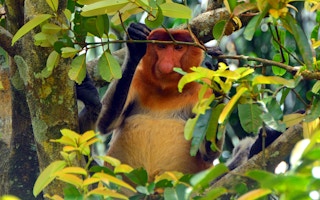World Wildlife Day, celebrated on March 3rd each year, gives us an occasion to celebrate and appreciate the many beautiful plants and animals that share our planet. It is also an occasion to raise awareness about the interdependence of wildlife, people and sustainable development and to demonstrate why the continued presence of wildlife is vital for humanity’s well-being.
To continue reading, subscribe to Eco‑Business.
There's something for everyone. We offer a range of subscription plans.
- Access our stories and receive our Insights Weekly newsletter with the free EB Member plan.
- Unlock unlimited access to our content and archive with EB Circle.
- Publish your content with EB Premium.
This year’s theme “The future of wildlife is in our hands” recognizes the urgent need to step up our fight against wildlife crime because of its adverse economic, environmental and social consequences. Today illegal wildlife trade is estimated to be worth US$50-150 billion per year. Forest crime and illegal logging has been estimated to be between US$30–100 billion annually or between 10–30 per cent of total global timber trade.
Environmental crime is now a multi-billion dollar industry that finances criminal, militia and terrorist groups. But environmental crime – including the illegal trade in wildlife, timber, chemicals and waste - is much more than a criminal industry and affects much more than the environment.
Wildlife and forest crimes rob poor and vulnerable countries of revenues for schools, roads, health care and job creation, and deprives developing economies of billions of dollars in lost revenues. Quite simply, environmental crime threatens our very ability to meet the ambitious 2030 Sustainable Development Agenda adopted by Heads of State in New York last year.
“
Wildlife and forest crimes rob poor and vulnerable countries of revenues for schools, roads, health care and job creation, and deprives developing economies of billions of dollars in lost revenues.
The Sustainable Development Goals specifically highlight the need to take urgent action to end poaching and trafficking of protected species of flora and fauna and address both demand and supply of illegal wildlife products and also to end illegal, unreported and unregulated fishing.
In this region, Member States took a decision last year at the 10th ASEAN Ministerial Meeting on Transnational Crime to add “trafficking of wildlife and timber” to the list of regional priority transnational crime threats. It is a clear indication that in Southeast Asia such crimes are serious and growing. Wildlife and forest crime will now be considered as important as drug trafficking, human trafficking and smuggling, terrorism, and arms smuggling.
To turn these lofty global goals and regional ambitions into action will require coordination and collaboration between environmental policymakers, activists, frontline officers and police patrolling our boarders, judges and legislators, and also consumers.
In Asia Pacific we have seen how such collaboration can bring great results. Last year, five individuals and eight organizations received the Asia Environmental Enforcement Award. The winners, hailing from Cambodia, China, Philippines, Thailand, Tonga, Viet Nam and Tonga, were awarded for their efforts in confiscating nearly US$69 million in illegal contraband, logs and wood charcoal and seizures of nearly 300,000 tons of hazardous waste, wildlife products and timber like the Indian Red Sanders, a wood popularly used for idols and wooden artifacts.
Investigations into these crimes have resulted in nearly US$40 million in fines and more than US$100 million in frozen assets. Thailand’s Anti-Money Laundering Office won the award for their excellent work in detecting a wildlife trafficking case.
Building on existing efforts and innovative initiatives on the ground, we should continue our collaborative efforts to ensure that environmental crime will be on the top agenda for law makers, police, customs officers, prosecutors and judges, so that the whole enforcement chain is equipped to address environmental crime.
On this World Wildlife Day we recognize that our actions can prevent the illegal trade that is undermining our development, devastating our communities and threatening the very survival of the world’s wildlife. The future of wildlife is in our hands!
Kaveh Zahedi is regional director and representative, United Nations Environment Programme Regional Office for Asia and the Pacific.











